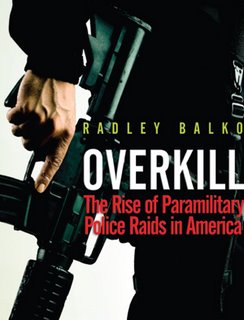[The following, which I wrote shortly after the Los Angeles riots of 1992, originally appeared in the June 1992 issue of my old out of step newsletter. When you come to references to “Studs,” a short-lived syndicated TV show, or Arsenio, please smile and keep in mind that this piece was written 14 years ago, although its message remains valid today.]
“We have been living under the delusion that government can solve the social problems of the people. Only the people can solve their own problems. ... The neighborhoods have the right to control their own affairs.” — Norman Mailer (1969 New York mayoralty race)
I knew L.A.’s immediate crisis was over when Channel 11 brought “Studs” back at 6:30. Then came the real crisis: the parade of politicians, journalists, and Mike Farrell types to assess damage, point fingers, and predictably call for more government spending on so-called assistance and rescue packages for the inner cities.
But these bandaids of state “compassion” come with a price tag neither Arsenio nor Newsweek will tell you about: more regimentation and restraint of neighborhoods already suffering from too little freedom and too much state control.
Case in point: South Central L.A. merchants wiped out during the riots were first told by City Hall that the usual red tape would be sidestepped and businesses would be rebuilt quickly. But the City’s social planners soon changed their minds.
It now seem that certain businesses — gun shops, liquor stores, secondhand stores, swap meets, and auto repair shops — can’t rebuild, after all, without running a governmental gauntlet of public hearings, licensing, and analyses. In other words, the City masters have taken the opportunity offered them by the burning and looting of L.A. to re-engineer South Central’s commercial areas and eliminate those businesses they consider “unsavory.”
Forget what the neighborhood wants. City Hall will tell them what it thinks they need.
Well, what we all need — not just the people of the inner cities — is a lot less central planning, not more. What we need is more localized control of the decision-making and more control over our neighborhoods and our own lives.
For example, the gangs of South Central say that they are at war with the Los Angeles cops. Of course, they are. The LAPD has long been a muscle-bound, paramilitary force in that community. Armed and controlled by centralized government, police officers assigned to the area harass citizens all day, then return home to Woodland Hills or Redondo Beach at night. Few cops have any personal ties to the communities in which they work.
Good-hearted liberals say that the police force must build better rapport between themselves and the Los Angeles community — as if this idea is “groundbreaking.” But why stop there?
Police should be managed by the very neighborhoods they serve. This ought to begin with localized police recruitment.
“As residents of the areas which they served, recognized as friends and neighbors by the local citizenry,” Jerome Tuccille wrote in Radical Libertarianism, “policemen would be more conscientious about preserving life and property in their own communities.” If cops have a stake in the areas they serve, in other words, “kinder and gentler” service will result.
Rather than lobby for state monies and further empower cumbersome, inefficient, repressive government, we must lobby for direct local control of education, housing, sanitation, parks, and police.
And the sooner, the better.































